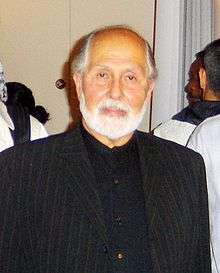Seyyed Hossein Nasr (Persian: سید حسین نصر, born April 7, 1933) is an Iranian professor emeritus of Islamic studies at George Washington University, and an Islamic philosopher. He is the author of scholarly books and articles. Nasr speaks and writes based on subjects such as philosophy, religion, spirituality, music, art, architecture, science, literature, civilizational dialogues, and the natural environment. He also wrote two books of poetry (namely Poems of the Way and The Pilgrimage of Life and the Wisdom of Rumi), and has been described as a 'polymath'.
Quotes
- For Muslims the Islamic Shari'ah, or Divine Law, is the concrete embodiment of the Divine Will as elaborated in the Quran for the followers of Islam; and from the Islamic point of view the scriptures of all divinely revealed religions, each of which possesses its own Shari'ah, have the same function in those religions. For Muslims, who accept the Quran as the Word of God, therefore, following the Divine Law is basic and foundational for the practice of their religion.
- For Muslims the Quran is the Word of God; it is sacred scripture, not a work of "literature," a manual of law, or a text of theology, philosophy or history although it is of incomparable literary quality, contains many injunctions about a Sacred Law, is replete with verses of metaphysical, theological, and philosophical significance, and contains many accounts of sacred history. The unique structure of the Quran and the flow of its content constitute a particular challenge to most modern readers. For traditional Muslims the Quran is not a typical "read" or manual to be studied. For most of them, the most fruitful way of interacting with the Quran is not to sit down and read the Sacred Tex from cover to cover (although there are exceptions, such as completing the whole text during Ramadan). it is, rather, to recite a section with full awareness of it as the Word of God and to meditate upon it as one whose soul is being directly addressed, as the Prophet's soul was addressed during its revelation. ... In this context it must be remembered that the Quran itself speaks constantly of the Origin and the Return, of all things coming from God and returning to Him, who himself has no origin or end. As the Word of god, the Quran also seems to have no beginning and no end. Certain turns of phrase and teachings about the Divine Reality, the human condition, the life of this world, and the Hereafter are often repeated, but they are not mere repetitions. Rather each iteration of a particular word, phrase, or verse opens the door of a hidden passage to other parts of the Quran. Each coda is always a prelude to an as yet undiscovered truth.
- Islamic science came into being from a wedding between the spirit that issued from the Qur'anic revelation and the existing sciences of various civilizations which Islam inherited and which it transmuted through its spiritual power into a new substance, at once different from and continuous with what had existed before it.
- Seyyed Hossein Nasr, Islamic Science. An Illustrated Study, photographs by Ronald Michaud, World of Islam Festival Publishing Company Ltd., London, 1976, p. 9.
- We have sought to make use of the full possibilities of the English language without the pretext of wanting to be so up-to-date in word usages that our rendition would soon become out-of-date. We have also sought to be as eloquent as possible, in an effort to reflect something of the inimitable eloquence of Quranic Arabic.
- On the Study Qur'an (2015). "Introduction". The Study Quran. HarperOne.
External links
This article is issued from
Wikiquote.
The text is licensed under Creative
Commons - Attribution - Sharealike.
Additional terms may apply for the media files.
